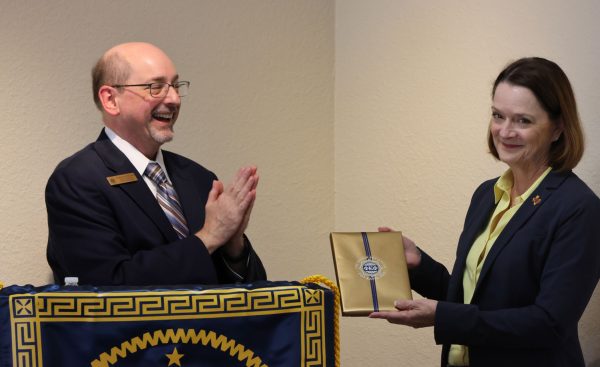Author, Carl Hoffman speaks at WFMA
As part of the Fall 2021 Speakers & Issues Series, the author and journalist, Carl Hoffman, spoke to faculty and students at the Wichita Falls Museum of Art about his book, “Savage Harvest: The Mysterious Disappearance of Michael Rockefeller” on Oct. 14.
“This is a great story, one that is complex and one of those things in which the truth is stranger than fiction. You can’t make this up,” Hoffman said. “It takes place in New Guinea. Currently, it is divided into two separate countries. At the time of Michael Rockefeller’s disappearance in 1961, it was a colony of the Netherlands, and Indonesia had been a Dutch colony for 300 years. At the time of the disappearance, it was the last piece of the Dutch colony.”
Hoffman started with the description of the island where the disappearance occurred, now known as Indonesia, to explain the geographic area and let the audience understand the relationship between the Netherlands and the native people of the area known as the Asmat people. Did Rockefeller drown? Was he attacked by a shark? Or was he killed by the natives? Hoffman explained to the audience the importance of the Netherlands in his book. At the presentation, students in the audience saw Dutch newspaper articles from 1961 about the disappearance, revenge killing and how the relationship with the country helped shape the book.
“Actually, [on] the amount of Dutch involvement, my brother and I are both Dutch. Our father is from the Netherlands, so it was interesting getting to see excerpts from newspapers,” Pan Nihof, chemistry and biology senior, said. “As the author started talking, it was actually really interesting. I didn’t know there was this Dutch aspect of it. I know cultures have very different parts to them and they view death in a very different way, but the revenge killing seems like it’s not as terrifying as it is in Western culture.”
Hoffman visited the tribes of Asmat peoples and described the Asmat natives as headhunters and cannibals. He explained that revenge killing was part of the Asmat culture and may have been the real reason behind Rockefeller’s disappearance.
“It’s not like ‘oh my gosh you murdered someone.’ It’s more like you took the life of someone important to us, so we’ll have to, kind of, equal the balance. So, I thought that was interesting,” Nihof said. “All of it ended up being really fascinating because there is so much information.”
Hoffman spoke of cannibalism perhaps being the reason behind the tragedy and showed pictures of him living within the community, eating and celebrating with songs and drums with the natives. Hoffman made clear that he never asked the natives, specifically, about Rockefeller, with hopes of a natural confession. After years of investigation, Hoffman wrote “Savage Harvest: The Tale of Cannibals, Colonialism, and Michael Rockefeller’s Tragic Quest,” a book that made Hoffman well known in the literary community.
“The New York Times Best Selling author provides a convincing answer with this book. It’s a striking page-turner that was one of Washington Post’s 50 most notable works of non-fiction for 2014 and number one on Amazon.com,” Greg Giddings, associate professor in English, said. “To discover what happened to Rockefeller, Hoffman traveled to New Guinea and learned Indonesian and even lived with a tribe of headhunters. The author immersed himself in the Asmat culture [and] that allowed him to learn the ultimate fate of Michael Rockefeller.”
The audience was able to ask questions after the presentation and were able to interact with Hoffman visiting WFMA. Answers to Rockefeller’s tragic disappearance may never be officially solved, but students and faculty were able to make better assertions after seeing a direct explanation from the author of the book.
“For me, it was how people have different opinions about how he died. Some said he probably drowned, others said maybe somebody else or also the revenge killing of the people from different villages,” Stephanie Garcia, nursing sophomore, said. “But it ended up being, probably, just [somebody] there at the wrong place, wrong time.”






